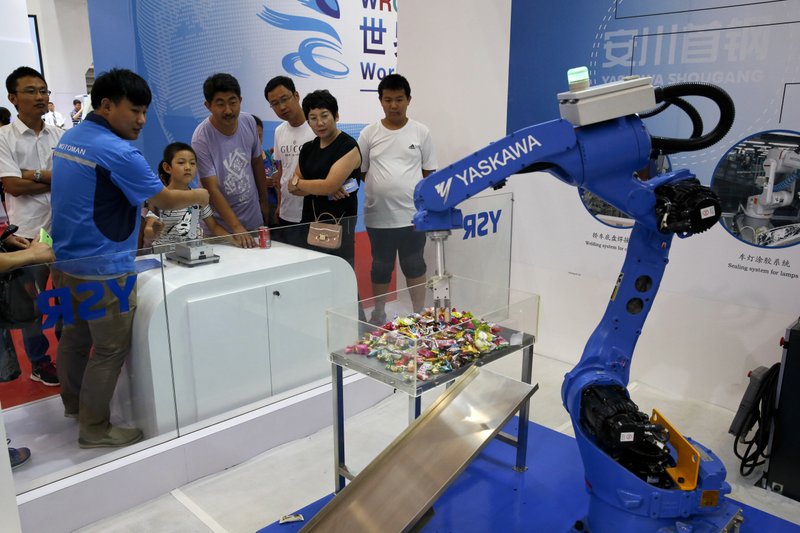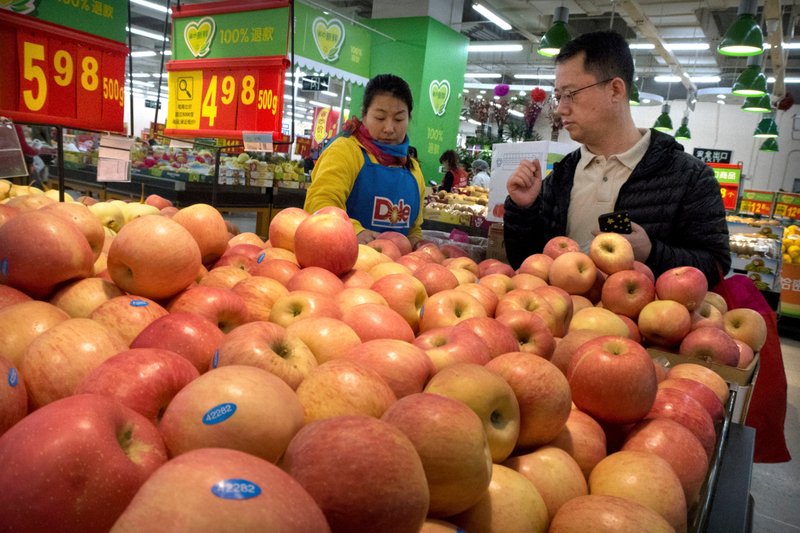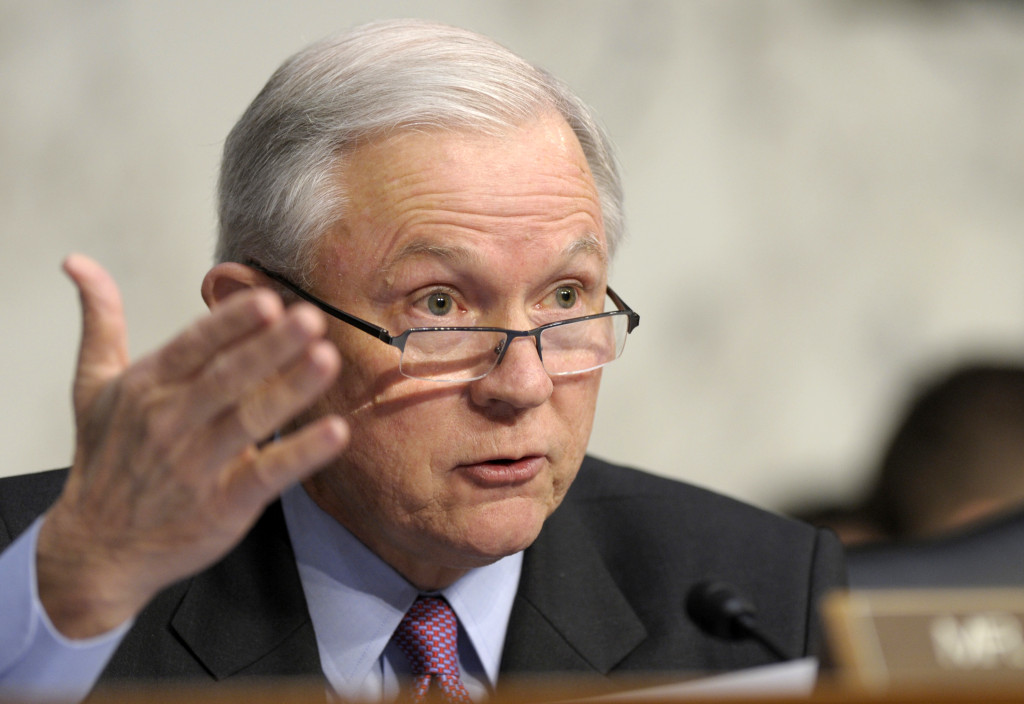US proposes tariffs on $50 billion in Chinese imports

The Trump administration on Tuesday escalated its aggressive actions on trade by proposing 25 percent tariffs on $50 billion in Chinese imports to protest Beijing’s policies that require foreign companies to hand over their technology. China immediately said it would retaliate against the new tariffs, which target high-tech industries that Beijing has been nurturing, from advanced manufacturing and aerospace to information technology and robotics. The Office of the U.S. Trade Representative issued a list targeting 1,300 Chinese products, including industrial robots and telecommunications equipment. The suggested tariffs wouldn’t take effect right away: A public comment period will last until May 11, and a hearing on the tariffs is set for May 15. Companies and consumers will have the opportunity to lobby to have some products taken off the list or have others added. The latest U.S. move risks heightening trade tensions with China, which on Monday had slapped taxes on $3 billion in U.S. products in response to earlier U.S. tariffs on steel and aluminum imports. “China’s going to be compelled to lash back,” warned Philip Levy, a senior fellow at the Chicago Council on Global Affairs and an economic adviser to President George W. Bush. The cherry industry in Washington state is worried its exports to China will be hurt by a growing trade war that escalated Monday when that country raised import duties on a $3 billion list of products. (April 3) Early Wednesday in Beijing, China’s Commerce Ministry said it “strongly condemns and firmly opposes” the proposed U.S. tariffs and warned of retaliatory action. “We will prepare equal measures for U.S. products with the same scale” according to regulations in Chinese trade law, a ministry spokesman said in comments carried by the official Xinhua News Agency. The U.S. sanctions are intended to punish China for deploying strong-arm tactics in its drive to become a global technology power. These include pressuring American companies to share technology to gain access to the Chinese market, forcing U.S. firms to license their technology in China on unfavorable terms and even hacking into U.S. companies’ computers to steal trade secrets. The administration sought to draw up the list of targeted Chinese goods in a way that might limit the impact of the tariffs — a tax on imports — on American consumers while hitting Chinese imports that benefit from Beijing’s sharp-elbowed tech policies. But some critics warned that Americans will end up being hurt. “If you’re hitting $50 billion in trade, you’re inevitably going to hurt somebody, and somebody is going to complain,” said Rod Hunter, a former economic official at the National Security Council and now a partner at Baker & McKenzie LLP. Kathy Bostjancic of Oxford Economics predicted that the tariffs “would have just a marginal impact on the U.S. economy” — unless they spark “a tit-for-tat retaliation that results in a broad-based global trade war.” Representatives of American business, which have complained for years that China has pilfered U.S. technology and discriminated against U.S. companies, were nevertheless critical of the administration’s latest action. “Unilateral tariffs may do more harm than good and do little to address the problems in China’s (intellectual property) and tech transfer policies,” said John Frisbie, president of the U.S.-China Business Council. Even some technology groups that are contending directly with Chinese competition expressed misgivings. “The Trump administration is right to push back against China’s abuse of economic and trade policy,” said Robert Atkinson, president of the Information Technology and Innovation Foundation think tank. However, he said the proposed U.S. tariffs “would hurt companies in the U.S. by raising the prices and reducing consumption of the capital equipment they rely on to produce their goods and services.” “The focus should be on things that will create the most leverage over China without raising prices and dampening investment in the kinds of machinery, equipment, and other technology that drives innovation and productivity across the economy,” Atkinson added. The United States has become increasingly frustrated with China’s aggressive efforts to overtake American technological supremacy. And many have argued that Washington needed to respond aggressively. “The Chinese are bad trading partners because they steal intellectual property,” said Derek Scissors, a China specialist at the conservative American Enterprise Institute. In January, a federal court in Wisconsin convicted a Chinese manufacturer of wind turbines, Sinovel Wind Group, of stealing trade secrets from the American company AMSC and nearly putting it out of business. And in 2014, a Pennsylvania grand jury indicted five officers in the Chinese People’s Liberation Army on charges of hacking into the computers of Westinghouse, US Steel and other major American companies to steal information that would benefit their Chinese competitors. To target China, Trump dusted off a Cold War weapon for trade disputes: Section 301 of the U.S. Trade Act of 1974, which lets the president unilaterally impose tariffs. It was meant for a world in which much of global commerce wasn’t covered by trade agreements. With the arrival in 1995 of the Geneva-based World Trade Organization, Section 301 largely faded from use. Dean Pinkert of the law firm Hughes Hubbard & Reed, found it reassuring that the administration didn’t completely bypass the WTO: As part of its complaint, the U.S. is bringing a WTO case against Chinese licensing policies that put U.S. companies at a disadvantage. China has been urging the United States to seek a negotiated solution and warning that it would retaliate against any trade sanctions. Beijing could counterpunch by targeting American businesses that depend on the Chinese market: Aircraft manufacturer Boeing, for instance, or American soybean farmers, who send nearly 60 percent of their exports to China. Rural America has been especially worried about the risk of a trade war. Farmers are especially vulnerable targets in trade spats because they rely so much on foreign sales. “Beijing right now is trying to motivate US stakeholders to press the Trump Administration to enter into direct negotiations with China and reach a settlement before tariffs are imposed,” the Eurasia Group consultancy said in a
China raises tariffs on US pork, fruit in trade dispute

China raised import duties on a $3 billion list of U.S. pork, fruit and other products Monday in an escalating tariff dispute with President Donald Trump that companies worry might depress global commerce. The Finance Ministry said it was responding to a U.S. tariff hike on steel and aluminum that took effect March 23. But a bigger clash looms over Trump’s approval of possible higher duties on nearly $50 billion of Chinese goods in a separate argument over technology policy. The tariff spat is one aspect of wide-ranging tensions between Washington and Beijing over China’s multibillion-dollar trade surplus with the United States and its policies on technology, industry development and access to its state-dominated economy. Forecasters say the immediate impact should be limited, but investors worry the global recovery might be set back if it prompts other governments to raise import barriers. Those fears temporarily depressed financial markets, though stocks have recovered some of their losses. On Monday, stock market indexes in Tokyo and Shanghai were up 0.5 percent at midmorning. Beijing faces complaints by Washington, the European Union and other trading partners that it hampers market access despite its free-trading pledges and is flooding global markets with improperly low-priced steel and aluminum. But the EU, Japan and other governments criticized Trump’s unilateral move as disruptive. The United States buys little Chinese steel and aluminum following earlier tariff hikes to offset what Washington says is improper subsidies. Still, economists expected Beijing to respond to avoid looking weak in a high-profile dispute. Effective Monday, Beijing raised tariffs on pork, aluminum scrap and some other products by 25 percent, the Finance Ministry said. A 15 percent tariff was imposed on apples, almonds and some other goods. The tariff hike has “has seriously damaged our interests,” said a Finance Ministry statement. “Our country advocates and supports the multilateral trading system,” said the statement. China’s tariff increase “is a proper measure adopted by our country using World Trade Organization rules to protect our interests.” The White House didn’t respond to a message from The Associated Press on Sunday seeking comment. China’s government said earlier its imports of those goods last year totaled $3 billion. The latest Chinese move targets farm areas, many of which voted for Trump in the 2016 presidential election. U.S. farmers sent nearly $20 billion of goods to China in 2017. The American pork industry sent $1.1 billion in products, making China the No. 3 market for U.S. pork. “American politicians better realize sooner rather than later that China would never submit if the U.S. launched a trade war,” said the Global Times, a newspaper published by the ruling Communist Party. Washington granted EU, South Korea and some other exporters, but not ally Japan, exemptions to the steel and aluminum tariffs on March 22. European governments had threatened to retaliate by raising duties on American bourbon, peanut butter and other goods. Beijing has yet to say how it might respond to Trump’s March 22 order approving possible tariff hikes in response to complaints China steals or pressures foreign companies to hand over technology. Trump ordered U.S. trade officials to bring a WTO case challenging Chinese technology licensing. It proposed 25 percent tariffs on Chinese products including aerospace, communications technology and machinery and said Washington will step up restrictions on Chinese investment in key U.S. technology sectors. Trump administration officials have identified as potential targets 1,300 product lines worth about $48 billion. That list will then be open to a 30-day comment period for businesses. Beijing reported a trade surplus of $275.8 billion with the United States last year, or two-thirds of its global total. Washington reports different figures that put the gap at a record $375.2 billion. Republished with the permission of the Associated Press.
Donald Trump, Paul Ryan face off in rare public GOP clash over tariffs

In a remarkably public confrontation, House Speaker Paul Ryan and other Republican allies of President Donald Trump pleaded with him Monday to back away from his threatened international tariffs, which they fear could spark a dangerous trade war. Trump retorted: “We’re not backing down.” The president said U.S. neighbors Canada and Mexico would not be spared from his plans for special import taxes on steel and aluminum, but he held out the possibility of later exempting the longstanding friends if they agree to better terms for the U.S. in talks aimed at revising the North American Free Trade Agreement. “We’ve had a very bad deal with Mexico; we’ve had a very bad deal with Canada. It’s called NAFTA,” he declared. Trump spoke shortly after a spokeswoman for Ryan, a Trump ally, said the GOP leader was “extremely worried” that the proposed tariffs would set off a trade war and urged the White House “to not advance with this plan.” Likewise, Republican leaders of the House Ways and Means Committee circulated a letter opposing Trump’s plan, and GOP congressional leaders suggested they may attempt to prevent the tariffs if the president moves forward. Trump’s pledge to implement tariffs of 25 percent on steel imports and 10 percent on aluminum imports has roiled financial markets, angered foreign allies and created unusual alliances for a president who blasted unfavorable trade deals during his 2016 campaign. Union leaders and Democratic lawmakers from Rust Belt states have praised the planned tariffs, joining with advocates within the administration including Commerce Secretary Wilbur Ross and White House trade adviser Peter Navarro. But the president has been opposed internally by Defense Secretary James Mattis and White House economic adviser Gary Cohn, who warned against penalizing U.S. allies and undercutting the economic benefits of the president’s sweeping tax overhaul. Likewise, the statement from Ryan’s office said, “The new tax reform law has boosted the economy, and we certainly don’t want to jeopardize those gains.” Asked about that public rebuke, White House press secretary Sarah Huckabee Sanders said, “Look, we have a great relationship with Speaker Ryan. We’re going to continue to have one, but that doesn’t mean we have to agree on everything.” Canada is the United States’ No. 1 foreign supplier of both steel and aluminum. Mexico is the No. 4 supplier of steel and No. 7 for aluminum. Congressional Republicans say any tariffs should be narrow in scope, and they privately warned that Trump’s effort could hurt the party’s hopes to preserve its majority in the fall elections. As the president dug in on his position, any potential compromise with foreign trading partners and Republican lawmakers was expected to still include some form of tariffs. “Trump is not someone who retreats,” said Stephen Moore, an economist with the conservative Heritage Foundation and a former campaign adviser. “He’s going to need to be able to declare some victory here.” The tariffs will be made official in the next two weeks, White House officials said. “Twenty-five percent on steel, and the 10 percent on aluminum, no country exclusions — firm line in the sand,” said Navarro, speaking on “Fox and Friends.” Republican critics on Capitol Hill and within the administration argue that industries and their workers that rely on steel and aluminum for their products will suffer. The cost of new appliances, cars and buildings will rise for Americans if the president follows through, they warn, and other nations could retaliate. Two dozen conservative groups, including the Club for Growth, FreedomWorks and the National Taxpayers Union, urged Trump to reconsider, writing in a letter that the tariffs would be “a tax on the middle class with everything from cars to baseball bats to even beer.” The Trade Partnership, a consulting firm, said the tariffs would increase U.S. employment in the steel and aluminum sector by about 33,000 jobs but would cost 179,000 jobs in the rest of the economy. The end result could erode the president’s base of support with rural America and even the blue-collar workers the president says he’s trying to help. “These are people that voted for him and supported him in these auto-producing states,” said Cody Lusk, president of the American International Automobile Dealers Association. Lusk noted that of the 16 states with auto plants, Trump won all but two. The administration has argued the tariffs are necessary to preserve the American aluminum and steel industries and protect national security. But Trump’s comments and tweets early Monday suggested he was also using them as leverage in the current talks to revise NAFTA. The latest round of a nearly yearlong renegotiation effort is concluding this week in Mexico City. At those talks, U.S Trade Representative Robert Lighthizer said Monday that progress has been less than many had hoped and “our time is running short.” “I fear the longer we proceed, the more political headwinds we will feel,” he said. And he added that if three-way negotiations don’t work, “we are prepared to move on a bilateral basis.” More upbeat about progress until now, Dan Ujczo, a trade attorney with Dickinson Wright PLLC in Columbus, Ohio, said, “We were moving toward the finish line in NAFTA.” But he added, “This has the potential to throw the NAFTA talks off track.” He said neither Canada nor Mexico will want to be seen as giving in to U.S. pressure. Indeed, he said, Canada is probably already drawing up lists of U.S. products to tax in retaliation. Separately, Mexican Economy Secretary Ildefonso Guajardo tweeted: “Mexico shouldn’t be included in steel & aluminum tariffs. It’s the wrong way to incentivize the creation of a new & modern #NAFTA.” The president opened the door to exempting Canada and Mexico from the tariffs, saying, “That would be, I would imagine, one of the points that we’ll negotiate.” But he added, “If they aren’t going to make a fair NAFTA deal, we’re just going to leave it this way.” Trump has long threatened to pull out of the 24-year-old trade pact if it
International trade body rules in favor of Alabama tire manufacturers; Jeff Sessions weighed in

After testimony from Alabama’s junior U.S. senator, Jeff Sessions, the U.S. International Trade Commission has ruled in favor of American tire manufacturers based in Alabama. A news release issued by Sessions’ office praised the commission, which ruled the communist government of China improperly subsidized their domestic tire industry, resulting in a “material injury” to American manufacturing interests. “The International Trade Commission’s decision to impose relief from illegal Chinese tire imports is good news for Alabama workers,” said Sessions in a prepared statement on Tuesday. “The ITC had already found that China was improperly subsidizing tire production in the past, but when that relief expired those unfair practices resumed and American workers suffered. The day is past when the United States can stand to see a single additional job lost due to unfair practices by our trading partners,” Sessions said. Sessions had previously testified before the commission in June, where he argued forcefully against China’s protectionist policies designed to undercut foreign competition. “I don’t accept the notion that we should send thank you notes to nations that ship us goods at illegally subsidized prices, that have the result of eliminating American competitors and shifting their unemployment to the United States,” testified Sessions before the commission. “As a result, this nation is facing very serious challenges to its strong manufacturing base. Currency manipulation, tariffs, and non-tariff barriers hammer American industries and workers. “Our trade competitors strongly desire access to our market, and we can benefit from the import of foreign goods. However, we have every right, and a duty, to ensure that such access is accompanied with compliance with the rules of trade. This is not free trade. And this nation cannot be so tied to a religion of free trade that we enable such bad behavior.” Among the Alabamian beneficiaries of the ruling would be Michelin plants in Dothan and Tuscaloosa and a Goodyear plant in Gadsden. The commission plans to make its final report public by Aug. 24, 2015.


